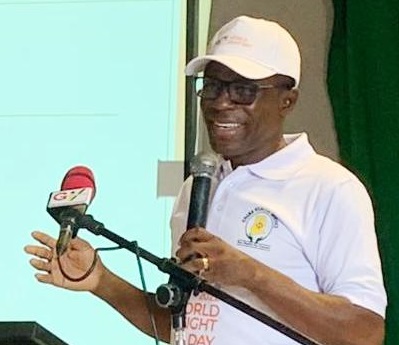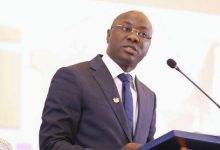
About 229,000 Ghanaians representing 0.74 per cent of the Ghanaian population are blind, the head of National Eye Care Unit of the Institutional Health Care division of the Ghana Health Service (GHS), Dr Hornametor Afake has indicated.
Out of this number, he said Cataract accounted for 126,170 of total blindness representing 54.8 per cent of the cause of blindness.
This was followed by Glaucoma with 44,503 representing 19.4, per cent, Posterior Segment 29,822 representing 12.9 per cent and Cornea Opacity 25,234 representing 11.2 per cent.
Dr Afake was speaking at the 2022 World Sight Day celebration in Accra which was on the theme “Love Your Eyes.”
For him, the eye was a delicate member of the body and it required special attention like regular eye checking as more and more people were losing their sight.
Dr Afake said some 331,700 people representing 1.07 per cent of the population had severe visual impairment adding that the prevalence of blindness was higher in the rural areas of Ghana 0.79 per cent than in the urban areas 0.67.
“Also, 67.74 per cent of those blind numbering 155,992, dwell in areas with little or no access to quality eye care services,” he stated.
The Head of the National Eye Care Unit said 54.8 per cent of blind people in the country were females indicating that women were 40 per cent less likely to utilise eye care services than men.
“Children with vision impairment are up to five times less likely to be in formal education and often achieve poorer outcomes. Unaddressed poor vision results in $411 billion in lost productivity each year, globally.
The annual global costs of productivity losses associated with vision impairment from uncorrected myopia and presbyopia alone were estimated to be US$ 244 billion and US$ 25.4 billion, respectively,” he added.
Acting Director of Institutional Care Division, GHS, Dr Lawrence Ofori-Boadu, said there were effective eye care interventions covering promotion, prevention, treatment and rehabilitation saying Cataract surgery can restore vision.
“The Eye Care Unit coordinates surgical outreaches under the National Cataract Outreach Programme with over 7,000 surgeries performed in the first half of 2022,” he said.
He added that healthy vision was the thread that ran through almost every aspect of sustainable development goals thus the government was working with partners to ensure all Ghanaians had access to quality eye care services.
Non-governmental Organisations (NGOs) working to bring eye care closer to Ghanaians, namely Orbis, Vision Aid, Swiss Red Cross, Vision Spring, HCP Cure Blindness and Operation Eye Sight Universal were recognised by the GHS.
BY BENEDICTA GYIMAAH FOLLEY



